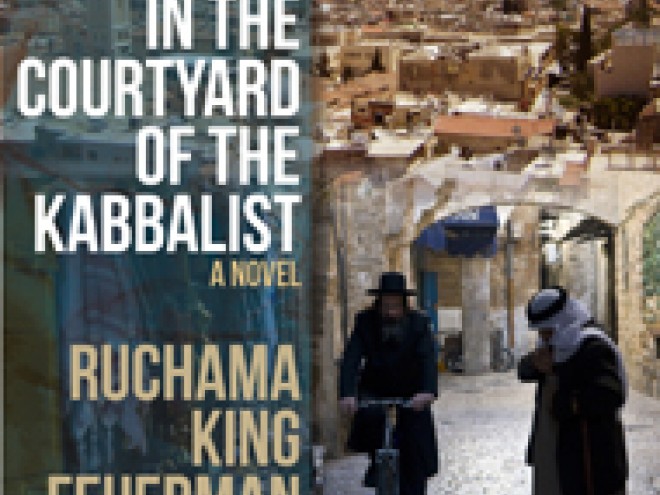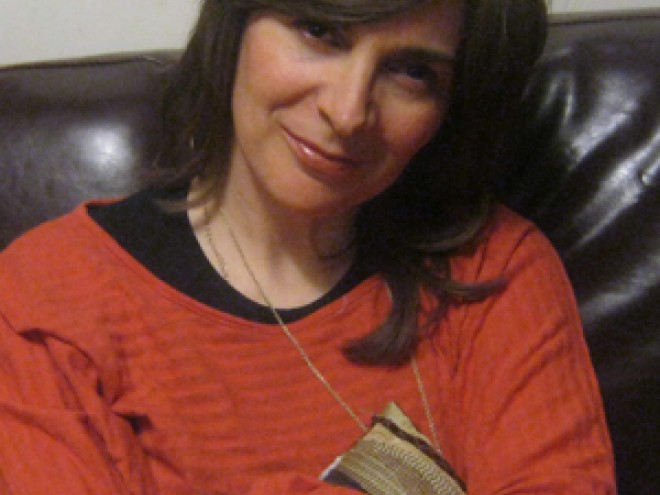Ruchama King Feuerman’s celebrated first novel about matchmaking (Seven Blessings, SMP) earned her the praise of The New York Times and Dallas Morning News, and Kirkus Reviews dubbed Feuerman the “Jewish Jane Austen.” Her most recent book, In the Courtyard of the Kabbalist (NYRB LIT), is now available. She will be blogging here all week for Jewish Book Council and MyJewishLearning.
 Ruchama King Feuerman’s Mother and Father
Ruchama King Feuerman’s Mother and FatherI rolled my eyes, laughed, and then I thought, hey, there’s a shtickel bit of truth here. In the Courtyard of the Kabbalist features a Muslim Arab man. My mother grew up in Casablanca, Morocco, which technically also makes her an Arab, even if she’s an Arabic Jew. Here’s the thing, though. Whenever friends meet my mother, they can’t believe we’re even remotely related. She can belly dance with the best of them and hunt down bargains and tchotchkes with a terrifying zeal. In her seventies she is still noticed, still the Casablancan glamour queen. In contrast, I’m happiest at a Chumash class or holed down in front of my computer in a ragged T‑shirt. Also, tchotchkes don’t mean a thing to me. She is so out there, and I am so in here, in myself. Conversations were not always easy. Sometimes yes, sometimes no.
But as I researched my novel, suddenly we found a lot to talk about. She lives in Israel now and has picked up a respectable Arabic, almost as good as her Parisian French. She knows the food, the phrases, the gestures, even if they differ a bit from one Arab country to another. A cornucopia of detail, a writer’s paradise! Of course I was also burrowing through books about Islam, reading memoirs about Arab workers, googling my way to Muslim dating websites and ask-the-Imam websites, and speaking with every Arab man and woman I knew in Passaic, but maybe my mother could fill in the gaps, make me feel more heimische with this culture I knew nothing about.
After I satisfied my need for details, I found myself hungry for stories of my mother’s childhood in Morocco. There’s the story of how her grandmother — another Moroccan beauty — was abducted by a rich sheikh when she was shopping for vegetables one day in the shuk. Through back-door channels and negotiations, my great-grandmother (then married and in her thirties) was returned unharmed, untouched.
“You see,” my mother says. “The Arabs in Morocco had a sense of honor.” I almost ask, “Maybe have more honor and not abduct women in the first place?” But I don’t like to disturb the conversational flow between us.
I love the stories that bring Jews and Arabs together in small but surprising ways – kind of the topic of my novel. My mother tells how her mother — my Grandma Estrella — would make a big pot of harira soup every day during Ramadan. It was my mother’s job to deliver it to their Muslim cleaning lady who lived in a basement in the French Quarter. Harira soup is a mouth-watering one-pot meal with meat, chickpeas, lentils, tomatoes, celery, lemon, cilantro, onion, and thickened with flour or very thin noodles — an Arabic version of minestrone soup, but much finer and tastier. This was the food eaten at the end of each day of Ramadan to sustain you for the next day’s fast. The pot would be left overnight at the maid’s, cleaned only with paper (not a sponge) for kosher reasons, and then returned the next morning. I’m entranced every time I hear this story: an employer cooking food daily for her cleaning lady; a Jew helping a Muslim fast on her holiday; and my favorite, a Muslim woman cleaning the pot with paper to keep the pot kosher.
 Ruchama King Feuerman’s Mother and Grandmother
Ruchama King Feuerman’s Mother and GrandmotherI ask my mother for other Moroccan recipes, how she celebrated the holidays, anything she can remember. She tells me about Grandma Estrella who did seamstress work for the King’s Palace, and Grandpa Emil’s barber shop. A famous Arab sheriff was so grateful for my grandfather’s barbering skill, he would deliver seven live chickens to Emil’s household just before Yom Kippur for Kapparot. We have fun with these stories, my mother and I. They bind us as surely as my children – her grandchildren – bind us.
When the Bergen Record comes and asks why I wrote the book, I give them my husband’s line. “I wrote it to be closer to my mother.” They laugh, but then push me for the real reason. I shrug. For now, that’s the only reason I can remember.
Read more about Ruchama King Feuerman and her newest novel, In the Courtyard of the Kabbalist, here.



